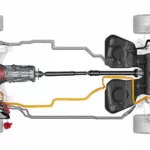Are we as Americans so addicted to our gas guzzling vehicles that we are unwilling to consider the benefits of more environmentally friendly forms of transportation, such as electric cars, unless it can be proven to us in a dollars and sense kind of way? That’s one take away to be considered from a recent global survey of electric vehicle opinions by research firm GfK.
In its study, GfK found only 36 percent of Americans think highly of electric vehicles, which ranks us a little above China only amongst six national markets looked at. Those who outrank us in terms of “very or mainly favorable opinion” were Japan (82%), Russia (72%), Spain (65%) and France (61%).

Image courtesy of Nissan
Researchers found the main barriers to buying one to be perceived high purchase prices and related maintenance costs. Domestic customers simply aren’t willing to pay more for electric cars compared to conventional ones, and would also like to see a wider range of choices, especially if it were offered as an option in the type of vehicle they were planning to purchase.
In contrast to us, Japanese drivers find that electric vehicles meet their direct personal needs because they are perceived by them as easy to operate, safe and reliable. They also see them as good value for money, noted GfK, and are willing to pay a premium price. Surprisingly, less than half of Japan’s intenders see ‘low emission / environment friendly’ as something that springs to mind when thinking about electric vehicles. There are no prevalent barriers to purchase.
China, sitting at the bottom of the heap of world markets considering electric cars, is in part there because opinions and feelings towards this type of personal transportation are not yet formed. Most have a neutral impression at this point.
Perhaps the only saving grace for American perceptions of electric cars are that there is a higher willingness to consider buying one if the concerns previously outlined can be addressed. Until then, we will mostly continue to ramble around in our less efficient cars and trucks and burn through gallon after gallon of gas.







